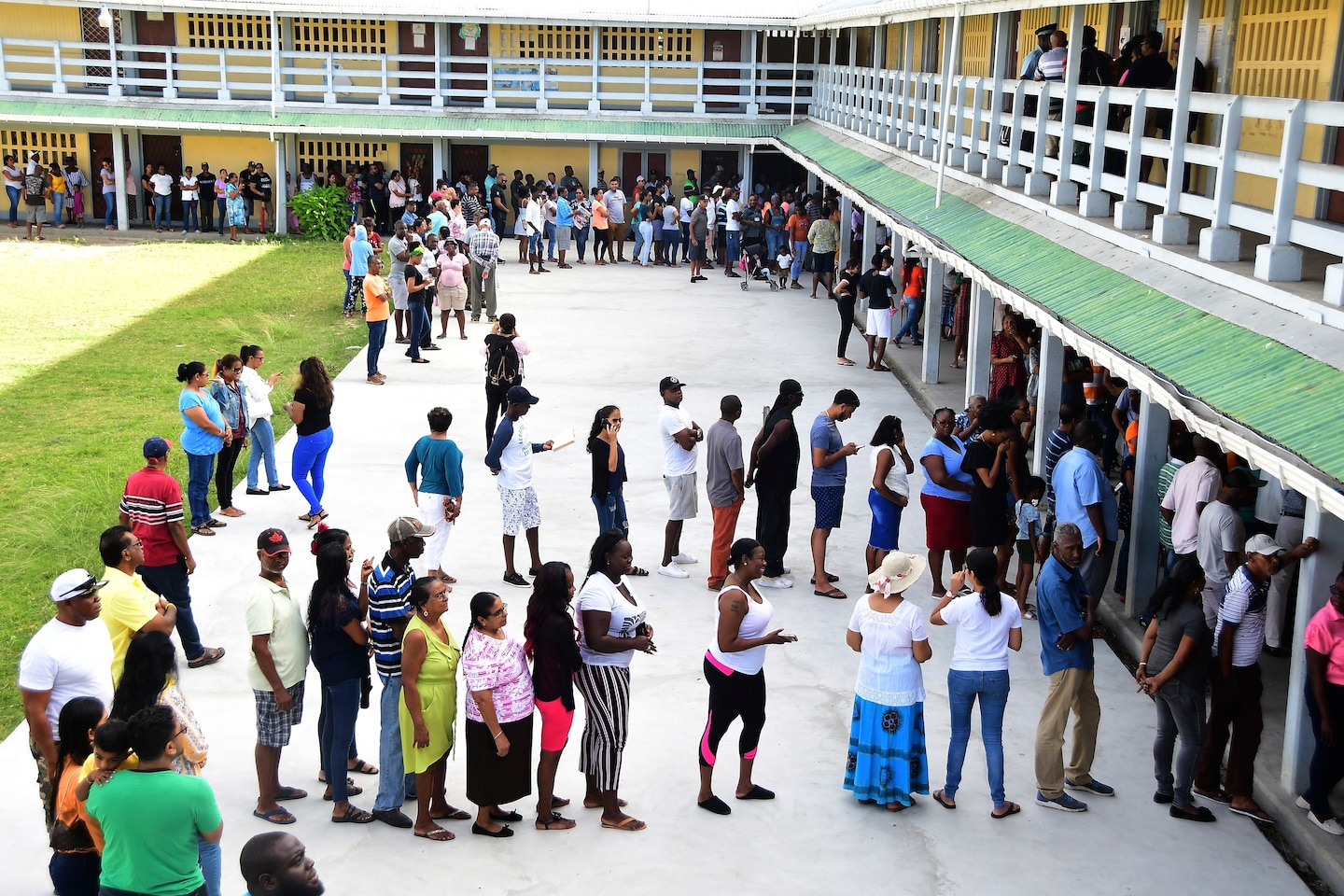Why Guyana’s political stalemate matters
[ad_1]

No, this isn’t Venezuela, but neighboring Guyana, which is entering its fifth month of political paralysis since the results of a March 2 presidential election were thrown into question by allegations of vote-rigging and fraud.
A lengthy recount of the ballots, which found a narrow victory for the opposition, only intensified the standoff. The ruling multiparty coalition led by President David Granger has latched on to an observations report by the country’s chief elections official, which said that as many as 115,000 of the approximately 400,000 votes cast in the election should be invalidated and that emigrants and the deceased were registered as having voted. Granger’s opponents reject the accusations as “baseless” and say their presidential candidate, Irfaan Ali, should be allowed to take the oath of office. The bulk of the international community, including Caricom, the Caribbean’s main regional bloc, and the Organization of American States, or OAS, appear eager for Granger to concede.
But he isn’t quite ready to do so. In a recent interview, Granger said his country and its interim government was abiding by a constitutional and legal process to manage its elections. Injunctions and appeals have taken the dispute to the Trinidad-based Caribbean Court of Justice. “Guyana is not a rogue state,” Granger told Today’s WorldView. “We are on a path, albeit a slow one.”
Nevertheless, Guyana is being increasingly viewed as a troublesome actor. The OAS issued a statement in June calling on Guyana “to begin the process of transition, which will allow the legitimately elected government to take its place.” Both OAS and Caricom observers certified the recount results and say there is enough evidence to justify Granger conceding defeat.
U.S. Secretary of State Mike Pompeo last week urged the Guyanese to “get on with it” and threatened potential punitive measures on Guyana or its leading officials if the country’s democracy remains deadlocked.
“Recent reports suggest questionable maneuvers by interested parties designed to continue forestalling a final declaration of results, which members of the press say indicates a defeat for the incumbent government,” read a bipartisan statement from members of the Senate Foreign Relations Committee, including Sens. Marco Rubio (R-Fla.) and Robert Menendez (D-N.J.). “President Granger should honor the will of the Guyanese people and concede.”
They added that, for the sake of “the future of democracy and the rule of law in our hemisphere, the ongoing uncertainty and gamesmanship must end.”
Granger urges outside patience. “I’m not a gamesman,” he said, insisting that the alleged rigging of the March election remained the real issue. “I don’t see any corruption, any fraud, delay,” Granger said of the impasse. “If there’s any fraud, it went into the boxes when the ballots were cast March 2.”
“The election is considered the most important since Guyana became independent from Britain in 1966, given the recent discovery of major oil and gas deposits near its coastline,” the Associated Press reported last month. “But the impasse has largely paralyzed life in the country of some 750,000 people. The Finance Ministry warned it’s unable to access funds amid the coronavirus pandemic because there is no functioning Parliament, which was dissolved in December.”
The delay has chilled investor enthusiasm in Guyana, where ExxonMobil has taken the reins of cultivating its oil industry. The U.S. company recently announced that the political stalemate and the challenges posed by the coronavirus pandemic were complicating its plans to ramp up oil production this year.
“The lure of petroleum revenue made these elections more exciting, perhaps more contentious than ever,” Granger admitted. But it also fueled a divisive election campaign that played largely along ethnic lines. The opposition People’s Progressive Party (PPP), once the dominant ruling faction, is heavily backed by Guyana’s Indian-origin population. Granger’s party draws its strength from Afro-Guyanese voters, though it is in alliance with a smaller faction that champions multiracialism. He and his allies point to the proliferation of “fake news” on social media and have accused the PPP of bringing in Cambridge Analytica, the notorious (and now defunct) British political consultancy, to weaponize racial grievances.
“International business headlines discuss investor confidence in this small South American country on the brink of political disaster,” wrote academics D. Alissa Trotz and Arif Bulkan. “But for Guyanese, the fundamental issue is how vulnerable our ongoing polarization makes us to this latest chapter of multinational resource extraction and exploitation.”
Granger appeared less perturbed. “We don’t have race riots or religious riots. We don’t have terrorism,” he said. “It’s a question of political competition, and I’m very confident it can be resolved in a peaceful way.”
